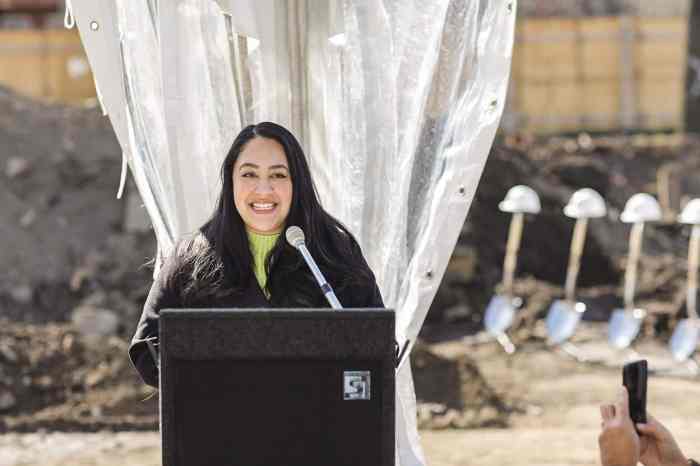Rochester judge says college has no obligation to extend partner benefits to lesbian employee
In an unpublished decision dated July 27 and first reported on August 18 by 365Gay.com online, New York State Supreme Court Justice Harold L. Galloway ruled that Monroe Community College in upstate Rochester is not required to enroll an employee’s same-sex spouse in the school’s employee health insurance plan.
Galloway said that requiring the college to do so, in a case involving a lesbian couple civilly united in Vermont and married in Canada, would be an “end-run” around the New York Court of Appeals’ recent ruling in Hernandez v. Robles, the group of same-sex marriage cases decided last month.
Patricia Martinez, a word processing supervisor at the college, and her partner Lisa Ann Golden entered into a civil union in Vermont in 2001, and three years later were married in Ontario. Upon returning to Rochester, Martinez wrote to the college’s human resources department asking to enroll Golden in the health insurance program.
At that time, the college’s faculty union contract included domestic partnership benefits, but the one for support staff did not. Oddly, the support staff contract didn’t even specifically mention spousal benefits, but they were given as a matter of custom. The human resources director took four months, until November 2004, to respond to Martinez’s request. Finally, Martinez received a letter informing her, “We have carefully researched the matter. Under our analysis, MCC is not required to provide benefits to Ms. Golden.”
Eight months earlier, state Attorney General Eliot Spitzer’s office issued an opinion letter taking the position that New York would recognize Canadian same-sex marriages, but it was not a binding ruling and was not even mentioned in Galloway’s decision.
Martinez’s lawsuit, filed by Rochester attorney Jeffrey Wicks as a cooperating attorney for the New York Civil Liberties Union, advanced several theories. She argued that denying the benefits violated the Equal Protection Clause of the state Constitution and the 2002 Sexual Orientation Non-Discrimination Act, and that the couple’s Canadian marriage was entitled to recognition under the principal of “comity” that courts apply to determine whether to recognize marriages contracted in other jurisdictions.
Galloway easily disposed of the first two arguments. In light of the Court of Appeals ruling in Hernandez, it was clear that as a matter of New York State constitutional law, same-sex couples are not entitled to marry nor is the state required to recognize same-sex marriages, he wrote. Quoting from Judge Victoria Graffeo’s concurring opinion in the Hernandez case, he wrote that this was not sexual orientation discrimination, since the same-sex marriage ban was based on the gender of the parties, not their sexual orientation. Graffeo reached this conclusion by pointing out that gay men can marry women, and lesbians can marry men.
But the comity argument regarding out-of-state marriages required a bit more discussion. Normally, comity is extended to such marriages unless to do so would violate the public policy of the state. Galloway began his analysis by invoking the federal Defense of Marriage Act, which excuses states from any duty under the U.S. Constitution’s full faith and credit clause to recognize same-sex marriages from other states. But that clause does not apply to the issues of foreign law, so the relevance of this citation is unclear. However, looking to DOMA’s legislative history, Galloway found that “its purpose was to defend traditional, heterosexual marriage… On the Federal level, then, it would appear that same-sex marriage is contrary to current national public policy.”
But the issue before the court was not whether the federal government should recognize the Martinez-Golden marriage, but rather whether Monroe Community College had to. On this point, Galloway turned back to last month’s Hernandez ruling.
“The issue of whether same-sex marriage, or some derivation thereof, should be permitted in New York is a matter of public policy, and currently, the policy in New York State is that same-sex marriage is not authorized or recognized,” he wrote. “Inasmuch as the marriage laws of Canada which recognize same-sex marriage are inconsistent with those of New York State, plaintiff’s same-sex marriage in Canada is not entitled to comity here.”
Galloway continued, “Essentially, to apply the principle of comity to plaintiff’s marriage would be to make an end-run around what the Court of Appeals has declared to be the will of the New York State Legislature, which currently defines marriage as limited to the union of one man and one woman. As neither Federal nor New York policy is consistent with permitting same-sex marriage, it would appear to be contrary to the nature of the principle to afford comity to plaintiff’s Canadian marriage.”
That analysis is a rather broad reading of Hernandez’s scope, which was concerned only with whether denying marriage to same-sex couples violated the New York Constitution. The New York Legislature has never explicitly addressed the issue of same-sex marriage, there is no state-level DOMA explicitly limiting marriage to the union of one man and one woman, and the Court of Appeals ruling in Hernandez does not address the issue of comity for out-of-state same-sex marriages.
Galloway’s conclusion on the comity issue is therefore debatable and makes for plausible grounds for the appeal that Martinez is making.
In the meantime, the union representing support staff at MCC won domestic partnership in negotiations last year, so Golden has been receiving insurance coverage since January 1.The case is not moot, however, since her costs for health care or insurance from mid-2004 through 2005 remain as potential damages.
gaycitynews.com

































